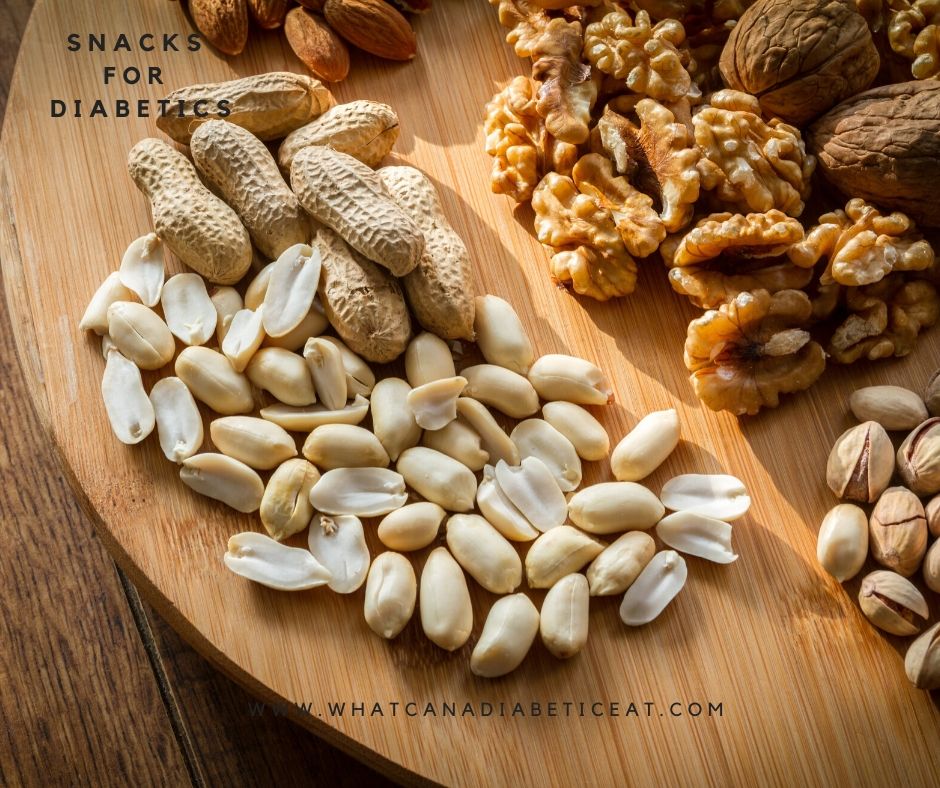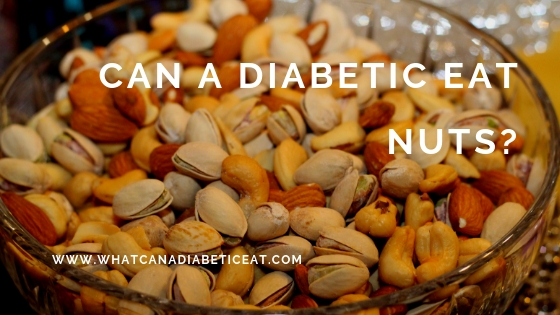Why eating nuts is good for diabetics?
In general, nuts make a very handy and nutritious snack for a diabetic. For this reason, a diabetic can get a wide range of nutrients by eating nuts. To summarize, nutrients available in nuts include proteins, vitamins, anti-oxidants, fibre, folate, minerals etc. The unsaturated fats present in nuts help in cell growth and protect vital organs such as the heart. You can always find nuts mentioned in diabetic meal plan as nuts are what a diabetic can eat for a snack at any time.

Does eating nuts cause blood sugar levels to rise?
In general, nuts are low in sugar or carbohydrate content. Also, the carbohydrates present in nuts are generally low in glycemic index. A low GI means nuts release carbs very slowly. This means nuts do not leave too much glucose in your blood stream. Thus eating nuts does not normally cause blood sugar levels to rise. You may check your blood sugar levels at home with a blood glucose meter like this.
Can a diabetic eat nuts everyday?
It is a good idea for a diabetic to eat a variety of nuts every day. Eating nuts as part of a diabetic diet can help reduce the risk of a heart disease. A diet containing nuts also helps keep blood sugar levels and blood cholesterol in control.
Nuts also help to keep blood pressure in check. A diabetic can eat nuts everyday to take advantage of great nutrients that nuts provide.
Is eating too many nuts unhealthful?
Though nuts are generally very healthful, a diabetic needs to watch on how many nuts to eat. As many nuts are high in calories, you end up consuming more calories when you eat nuts. Thus, if you eat too many nuts, you will have too many calories to burn. So if you do not burn as many calories, all the excess calories may end up as body weight. Thus, eating too many nuts can potentially result in weight gain and high cholesterol. So, a diabetic needs to watch portion size when eating nuts.
What are the best nuts for diabetics to eat?
A diabetic can eat any nuts with no added sugar or salt as long as the portion size is reasonable. There are however some very nutritious nuts that are easily available and offer great health benefits to diabetics.
Examples of best nuts for diabetics include peanuts, cashew nuts, almonds, pistachios and walnuts.
Peanuts
Peanuts are rich in protein and fibre. Eating peanuts regularly helps with weight loss, reduces bad cholesterol levels and reduces the risk of heart complications.
Cashew nuts
A diabetic on a diabetic diet including cashew nuts is more likely to have good control on cholesterol and blood pressure. Cashew nut diet also helps reduce heart disease risk. A diabetic can benefit from high levels of magnesium in cashews.
Almonds
Almonds are very nutritious, have plenty of vitamin E and tasty to eat. A diabetic is more likely to have better control on blood sugar levels and cholesterol if almonds are included in the diabetic diet. Almonds help reduce the risk of heart disease too.
Pistachios
Pistachios or Pista nuts are a great source of fibre and good fats. Eating pistachios regularly, reduces bad cholesterol levels, improves heart health and prevents more serious heart complications.
Walnuts
Walnuts are rich in healthy Omega-3 fatty acids. Eating walnuts regularly helps with diabetes management and controlling cholesterol.
What do nutritionists say about nuts and nutrition?
Many nutritionists recommend nuts as part of a balanced meal. A diabetic meal plan should thus include a variety of nuts to make sure diabetics get all the nutrition they need.
Which nuts are the most healthful?
Many nuts provide you with antioxidants. Antioxidants enhances body’s protection from disease. Nutritionists say generally all nuts are good in terms of nutrition. However, walnuts are the most healthful among nuts as they offer more benefits than almonds, pistachios, peanuts etc.
Which nut has the most fat?
Macadamia nuts are rich in monounsaturated fat and other nutrients. One ounce or 28 grams contains about 200 calories and 21 gm fat.
Which nut is high in protein?
Peanuts, almonds, cashew nuts, pistachios etc. are high in protein. High protein is also available from hemp seeds, sunflower seeds, pumpkin seeds, sesame seeds etc.





